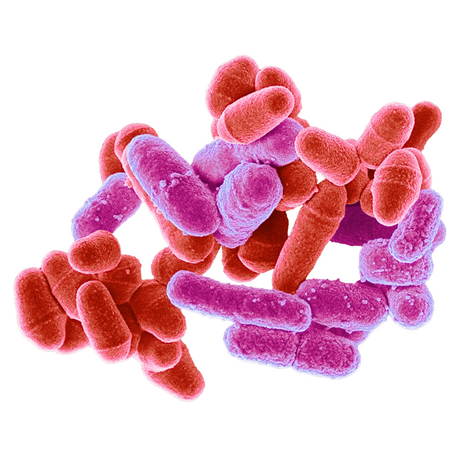"Gut health" is certainly a buzzword in wellness circles, but it's far more than a fleeting trend. The state of your gut has profound implications for your physical, emotional, and cognitive health and deserves more attention than you're probably giving it. So, what’s the big deal about gut health?
Your gut is your body's command centre
Your gut is packed with a complex network of over 100 million neurons—called the enteric nervous system (ENS)—that communicates directly with your brain (Belkaid & Hand, 2014). It's also home to trillions of bacteria, fungi, and other microorganisms that release hormones and send messages around the body. Your gut isn't just a food processing plant—it's a sophisticated ecosystem that affects your entire body.
Mental health starts in your gut
Ever had a "gut feeling" about something? That's not just a saying. Scientists now refer to the gut as the “second brain”. This is because the enteric nervous system (ENS), embedded in the walls of your gastrointestinal tract, communicates directly with your brain via the vagus nerve, forming the gut-brain axis. This complex network forms a direct pathway from your gut to your brain and back again. This pathway means your digestive system influences mood, stress, anxiety, and mental clarity. While most people think happiness comes from the brain, your gut actually produces about 90% of your body's serotonin—the key neurotransmitter that influences mood, anxiety, and overall emotional well-being (Gershon, 1998).
Research shows people with depression and anxiety often have imbalanced gut bacteria. Fix the gut, and mental health symptoms often improve. The connection works both ways—stress and poor mental health can also damage your digestive system (Foster et al., 2017).
Immunity
Your digestive tract is home to 70% of your immune system, with your intestinal lining serving as a checkpoint—determining what enters your bloodstream and what gets rejected.
Balanced gut bacteria act as immune system trainers, teaching your body to distinguish between genuine threats and harmless substances (Honda & Littman, 2016). A healthy gut functions as both factory and fortress—producing protective antibodies while maintaining a barrier that blocks harmful bacteria and toxins from entering your bloodstream. When this system fails because of poor gut health, it can trigger inflammation, allergies, and infections.
Weight management
Your gut bacteria also influences how you store fat, regulate blood sugar, and feel hungry or full. Certain bacteria are better at extracting calories from food, while others help regulate metabolism (Turnbaugh et al., 2006). This might be why you cut calories but don't lose weight, or why you eat the same as your partner but they lose more than you. An imbalanced gut microbiome might be making weight loss harder and weight gain easier (Lynch & Pedersen, 2016). People with diverse, healthy gut bacteria tend to maintain healthier weights more easily.
For more on this, read our article on Gut Health and Weight Loss.
Heart health
Poor gut health creates inflammation that can damage blood vessels and contribute to heart disease (Zmora et al., 2019). Also, some gut bacteria produce compounds that can raise cholesterol levels, while others help keep them in check (Tang et al., 2017). The gut also affects blood pressure, with healthy bacteria producing substances that help relax blood vessels, while harmful bacteria can contribute to hypertension.
Nutrient absorption
Healthy gut microbiome can also help you efficiently extract nutrients from food. You can eat the healthiest diet in the world, but if your gut isn't functioning properly, you might not absorb those nutrients effectively. A healthy gut is essential for breaking down food, absorbing nutrients, and eliminating waste (Koh et al., 2016).
Sleep and energy
Your gut bacteria follow a daily rhythm just like you do. When this rhythm is disrupted, it affects your sleep patterns and energy levels (Voigt et al., 2014). Gut bacteria also influence the production of melatonin, your body's natural sleep hormone, if your gut doesn't produce enough melatonin, your sleep is disrupted.
Essentially, poor gut health can desynchronise your body clock, making you more likely to have insomnia, restless sleep, and fatigue. Rebalance your gut, and you often see improvements in both sleep quality and energy levels.
Signs your gut needs attention
Your body might be sending you signals that your gut is out of balance:
Digestive symptoms: Bloating, wind, constipation, diarrhoea, reflux, or stomach cramps.
Mood changes: Increased anxiety, depression, irritability, or brain fog without other clear causes.
Frequent illness: Getting sick often or taking longer than usual to recover from infections.
Skin problems: Unexplained rashes, eczema, or acne that doesn't respond to topical treatments.
Sleep issues: Difficulty falling asleep, staying asleep, or feeling tired despite adequate sleep.
Cravings: Intense cravings for sugar or processed foods, which harmful bacteria thrive on.
Weight gain: Despite cutting calories or exercise.
How to help rebalance your gut
Eat more fibre: Fruit, vegetables, legumes, and whole grains feed your good gut bacteria (Makki et al., 2018). If you find getting enough fibre difficult (and most of us don't get enough), then try our prebiotic fibre supplement Alleviate.
Limit processed foods: Ultra-processed foods and artificial sweeteners can harm beneficial bacteria.
Manage stress: Chronic stress damages gut bacteria and gut motility (Foster et al., 2017). If lifestyle changes can't be made, then incorporate meditation, yoga, good quality sleep, breath work and daily doses of connection with nature and people.
Stay active: Exercise is associated with increased microbial diversity (Clarke et al., 2014) and helps reduce stress.
Stay hydrated: Drinking enough water helps to regulate bacteria balance and gut function.
The Bottom Line
Your gut health isn't distinct from your overall health—it determines your overall health. The trillions of microorganisms in your digestive system influence every aspect of how you feel and function. Investing in gut health through diet, lifestyle, and stress management isn't just about avoiding digestive issues, it's about optimising every aspect of your wellbeing.
The good news? Your gut bacteria can change relatively quickly (David et al., 2014). Add a daily prebiotic, eat well, rest well and exercise, and you could see improvements in how you feel within just a few days. Take care of your gut—and it will take care of you.
Please note that not all physical or mental health concerns are caused by gut imbalance. If you have any health concerns, you should always talk with your Doctor.
Feed your gut here >
References
- Belkaid, Y., & Hand, T. W. (2014). Role of the microbiota in immunity and inflammation. Cell, 157(1), 121-141.
- Clarke, S. F., et al. (2014). Exercise and associated dietary extremes impact on gut microbial diversity. Gut, 63(12), 1913-1920.
- Cryan, J. F., & Dinan, T. G. (2012). Mind-altering microorganisms: the impact of the gut microbiota on brain and behaviour. Nature Reviews Neuroscience, 13(10), 701-712.
- David, L. A., et al. (2014). Diet rapidly and reproducibly alters the human gut microbiome. Nature, 505(7484), 559-563.
- Foster, J. A., Rinaman, L., & Cryan, J. F. (2017). Stress & the gut–brain axis: regulation by the microbiome. Neurobiology of Stress, 7, 124-136.
- Gershon, M. D. (1998). The Second Brain. HarperCollins.
- Honda, K., & Littman, D. R. (2016). The microbiota in adaptive immune homeostasis and disease. Nature, 535(7610), 75-84.
- Koh, A., et al. (2016). From dietary fiber to host physiology: short-chain fatty acids as key bacterial metabolites. Cell, 165(6), 1332-1345.
- Lynch, S. V., & Pedersen, O. (2016). The human intestinal microbiome in health and disease. New England Journal of Medicine, 375(24), 2369-2379.
- Makki, K., et al. (2018). The impact of dietary fiber on gut microbiota in host health and disease. Cell Host & Microbe, 23(6), 705-715.
- Tang, W. W., et al. (2017). Gut microbiota-dependent trimethylamine N-oxide (TMAO) pathway contributes to both development of renal insufficiency and mortality risk in chronic kidney disease. Circulation Research, 120(7), 1162-1169.
- Turnbaugh, P. J., et al. (2006). An obesity-associated gut microbiome with increased capacity for energy harvest. Nature, 444(7122), 1027-1031.
- Voigt, R. M., et al. (2014). Circadian disorganization alters intestinal microbiota. PLoS One, 9(5), e97500.
- Zmora, N., et al. (2019). The role of the immune system in metabolic health and disease. Cell Metabolism, 29(3), 506-521.


